Monday Feb 23, 2026
Monday Feb 23, 2026
Tuesday, 26 January 2016 00:00 - - {{hitsCtrl.values.hits}}
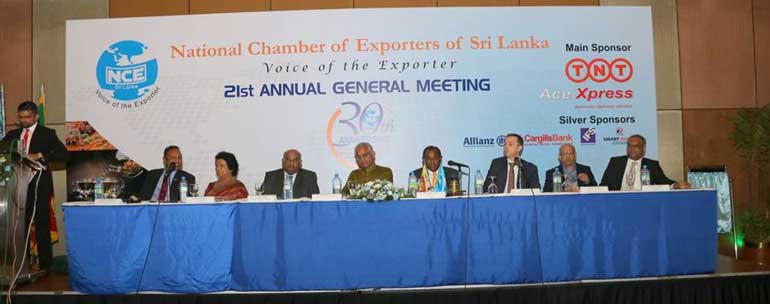
Newly appointed management committee

From left: President - Senior Vice President Sarada M De Silva, Vice President Ramal Jasinghe, Immediate Past President Ramya Weerakoon, Past President Dr. Jagath Peiris, Hony. Secretary Rohan Fernando, Assistant Hony.Secretary Thushari Weerakoon, - Hony. Treasurer Ravi Jayawardena, Council Member L. J. Wijebandara, and D. K. Rajapakse.
Following the official agenda of the National Chamber of Exporters of Sri Lanka (NCE) which is the only private sector Chamber which exclusively serves Sri Lankan exporters, its Annual General Meeting was held on 14 January at Hotel Galadari. This unique and glamorous event was attended by over 230 participants including member exporters, government officials and special invitees. The Chief Guest was Deputy Minister of State Enterprise Development, Eran Wickremaratne, while the Guest of Honour was Australian Deputy High Commissioner to Sri Lanka Tim Huggins. The Special Guest at the event was MTI Consulting CEO and well known Management Consultant Hilmy Cader – who delivered the keynote address on ‘Contemporary Issues’ related to Exports and the Challenges faced by Sri Lanka in the International Market Place' as well as the Strategies that need to be adopted to overcome the challenges.
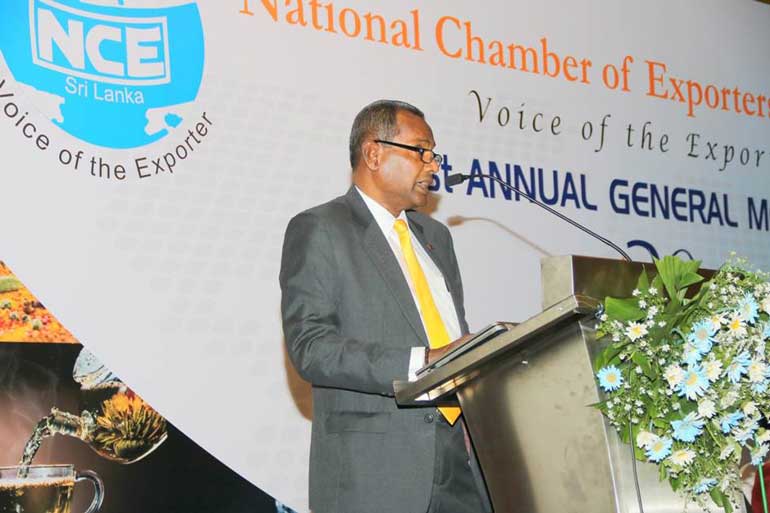
Welcome address by Sarada De Silva – President of the NCE for 2016
Sarada De Silva who was elected the President of the NCE for the 2nd year of his allotted term stated that public sector reforms are important to ensure strong economic growth. In this context public enterprise development is important particularly in relation to institutions such as Banks which provide services to exporters. He added that in the past public sector institutions have crowded out the private sector in regard to financial resources and human capital. As a result the private sector found it difficult to get the required human capital, since those seeking employment desired government jobs.
Sarada De Silva stated that the NCE welcomes some of the budget proposals such as the setting up of an Export Import Bank, promotion of sectors such as Information Technology, Spices, Gems and Jewellery , establishment of a development agency to support investors, single window for trade facilitation, assistance for Small and Medium Enterprises, anti-dumping legislation, promotion of innovation, and differentiation of export products and services, as well as Hi-Tech Products through venture capital assistance.
He stated that in order to grow exports key areas that need focus are technology, joint ventures, marketing as well as the need to diversify products and markets.
He also pointed out the necessity for the government to request the United Nations Industrial Development Organisation (UNIDO) to open a country office in Sri Lanka to enable local Industrialists to obtain significant services, as well as to address various technical issues faced by Sri Lankan Exporters.
In regard to the proposed and existing Free Trade Agreements of Sri Lanka, he emphasised that the Chamber is not against FTAs with any country. However, it was imperative that proper negotiations were undertaken by competent negotiators, in consultation with industry stake holders, to ensure that such agreements were beneficial to Sri Lanka.
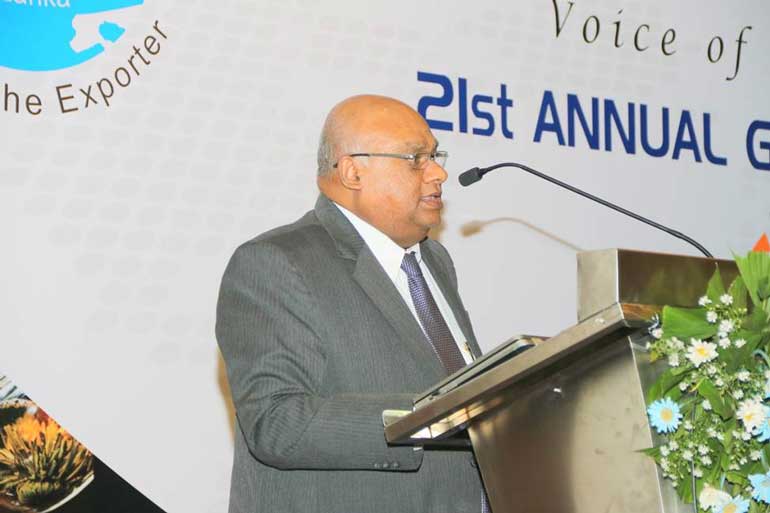
Address of Dr. Jagath Peiris- Immediate Past President of the NCE
Dr. Jagath Peiris outlined the achievements of the Chamber during the past 30 years of its existence. He stated that the exporters who make a vital contribution to the economic development of Sri Lanka have been resilient, and have performed even in times of great difficulty, particularly during the period of the civil conflict. In this context although Sri Lanka’s export performance and growth in exports over the last 10 to 15 years is often stated to be poor in comparison to the growth in exports achieved by countries such as Bangladesh and Vietnam, the constraints faced by Sri Lankan exporters during this period need to be taken into account. Some of these related to high energy costs, high interest rates, high rates of inflation, relatively poor infrastructure facilities, instability in the country, and the low level of demand from buyers due to the high level of production costs, lack of skilled labour etc. The withdrawal of the GSP Plus facility enjoyed by Sri Lankan exporters, as well as the ban on the export of fisheries products to the EU added to the problems faced by them.
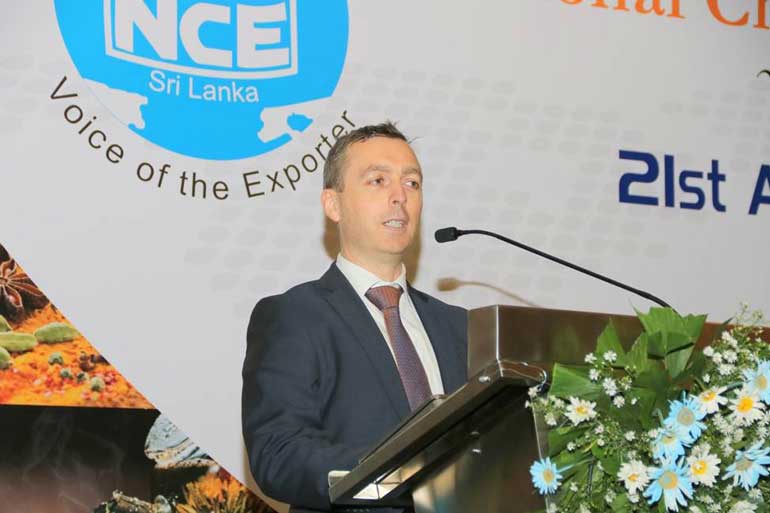
Address by Australian Deputy High Commissioner in Sri Lanka Tim Huggins
The Deputy High Commissioner while congratulating the NCE on its 30th anniversary stated that the Chamber marks its 30th year of services to Sri Lankan exporters at a time when prospects for Sri Lanka are looking very positive. In this context he highlighted the importance of business chambers such as the NCE for a strong economy, by playing a critical role representing the interests of members and encouraging the government to consider economic reforms for future benefit.
He stated that two way trade between Australia and Sri Lanka is expected to reach AUD 1 billion by the end of this year, since two way trade between the two countries in 2015 grew by 10% to reach AUD 910 million. He added that this is a particularly exciting time for Sri Lanka’s economy as it is currently undergoing a transitional phase with good economic prospects. In this context there is a great opportunity for trade and investment activities in various sectors between the two countries.
He noted that Sri Lanka has much potential as a trading nation, and that the business community was seeking to make the most of the traditional industries, and to search for new sectors to exploit the strengths, and the strategic location of the country, which includes an educated population, and a strong business community. In this regard he noted the desire and importance to tap into global and regional value chains, and to move up the value chain.
He stated that Australia was in a crisis in the 1970s before the big reform push of the 1980s, during which Australia moved from one of the most protected and developed economies, to one of the least protected, with the reduction over a 20 year period of all trade related barriers to almost zero, even in sensitive industries like textiles, clothing, and footwear. This task was undertaken unilaterally through FTAs and Multilateral Trade Agreements. Last year Australia finalised ambitious FTAs with China, Japan, and South Korea, building on FTAs with the US and countries of South East Asia, with an FTA with New Zealand as well. As a result Australian consumers have benefitted with a greater choice and cheaper goods, with the economy as a whole growing strongly for 24 consecutive years.
He further stated there are plenty of Australian companies interested in investing and trading with Sri Lanka. But the message that was heard from them is that they need more consistency in policies. Investors desire a 20 year timeline of assured regulatory stability. Nevertheless, Sri Lanka was marketed on the basis of her own potential, and quality of the business environment, Sri Lanka’s proximity to the booming Indian middle class market, and access through a Trade Agreement to that market.
Ambassador Huggins also highlighted the fact that open markets and regulatory certainty are big challenges for the government and for business, and that to reform the economy the government will need the support of Sri Lanka’s business community. In this context Sri Lankan businesses should be confident of their strengths and abilities to compete globally.
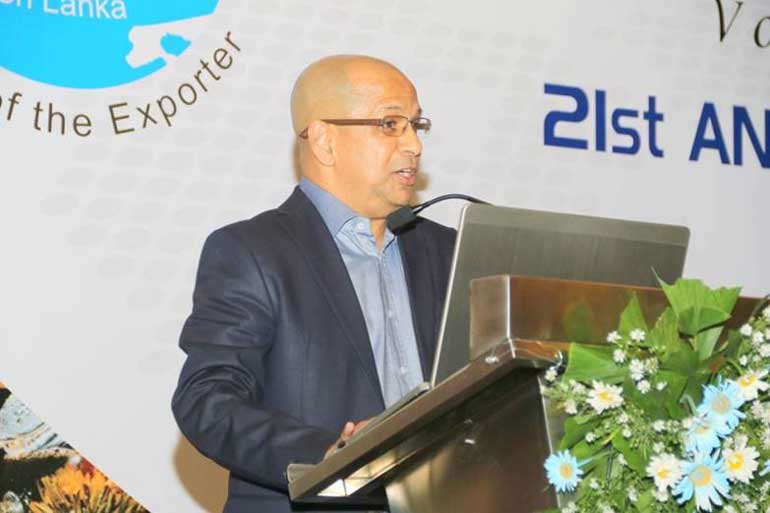
CEO of MTI Consulting Hilmy Cader delivers a special address on ‘Contemporary Issues, and Challenges for Sri Lankan Exports’
At the outset Hilmy Cader outlined the position of Sri Lankan exports at present which have grown from $ 5.5 billion in 2000 to $ 11.5 billion in 2014, which is a growth of 2.1 times in 15 years. In comparison exports of Bangladesh over the same period have grown from $ 7 billion to $ 33 billion which is a growth factor of 4.7 times, and exports of Vietnam have grown from $ 16 billion to $ 150 billion with a growth factor of 9.4 times. Further Sri Lankan imports were growing faster than exports while the percentage of exports to the GDP was reducing.
Hilmy raised the question whether Sri Lanka can continue to live with this situation. In this context the Sri Lankan definition of an export appears to be limited to Value Added in the country, whereas global markets demand in country value addition, which Sri Lanka tends to discourage, instead of encouraging Sri Lankan multinationals. On the other hand the world is looking for International and Regional Supply Chains.
He next raised the question as to what Sri Lanka can export. This is a complex question linked to the National Economic Plan of the Country, in which decisions for export resource allocation cannot be taken in isolation. What Sri Lanka can export relates to five major areas namely; (a) NATURAL RESOURCES, (b) HUMAN RESOURCES, (c) MANUFACTURING WITH INDUSTRY SPECIALISATION (d) LOCATIONAL ADVANTAGES AND (e) INTELLECTUAL PROPERTY.
Sri Lanka’s natural resources are confined to three main areas, namely; (a) AGRICULTURE, (b) AQUATIC AND (c) MINING.
In regard to agriculture, cultivation economies of scale in large land areas, as opposed to the large small holder base is required to compete with mass scale large crops. Also niche high value addition requiring focus on R & D, and investments in production infrastructure is needed to produce high value functional products, and key ingredients, based on, for example spices, essential oils, tea extracts etc.
In regard to human resources Sri Lanka has a high dependence on low skilled labour, which requires upgrading of skills, and reforms to the technical education infrastructure. At present the country is unable to compete in the mass scale BPO Industry. Since there is an opportunity for niche KPOs there is a need for migration to higher value addition. There is also a limited supply of professionals. Therefore, there is a critical need to align the educational supply chain of the country.
Manufacturing and Industry specialisation covers (a) in country raw material based players, for instance Rubber and Coconut based, which together accounts for only 1/3 of the main export sector apparel. (b) Human resources or entrepreneurial based players such as in apparel which accounts for 42% of current exports. In this regard manufacturing and industry specialisation has been Sri Lanka’s success story in the last 25 years, which requires globally competitive players with cutting edge value addition, and offers the best prospects for Sri Lanka to grow exports.
The potential opportunities related to locational advantages would consist of (a) an enabling transit port (b) Value added trading (c) Value added manufacturing (d) As a regional hub. Development of locational advantages involves high investment in infrastructure, enabling policies, and educational supply chain alignment, with a 10 plus year horizon. The challenges for locational advantages involve head on competition with established hubs. Development of the India gateway is a locational advantage as much as a hub.
Intellectual property involves high investment in R & D, exploiting of unique natural advantages, and the promotion of Multinational Corporations (MNCs), and global brands.
Two distinct approaches and responsibilities for exports were outlined. (a) A short term approach of upto 03 years and (b) a long term approach beyond three years, with a game changer focus via a dedicated team to evaluate strategic alternatives. In regard to short term approaches (i)a focus on protecting the current export base given the global challenges and (ii) export promotion of a critical mass based on high impact, directly linked the short term demand and (iii) to be realistic on expectations were highlighted.
In regard to export prioritisation five areas were mentioned. (a) Main earners such as apparel, tea and rubber based products (b) stable contributors such as diamonds, gems and jewellery (c) aspiring contenders such as spices and essential oils, and boat building (d) Potential future stars such as hub based entrepot trade, services, manufacturing (non apparel), and high value added agro and aquatic Products, (e) All others. The main earners, stable contributors, and aspiring contenders were identified for short term focus, and potential future stars for long term focus.
The prudence of the current approach of Sri Lanka to only help exporters to resolve their issues, whether they have the “hunger” for quantum growth, and the need to include “industry disruptors” were mentioned. In this regard the example of the achievements of the garment industry were mentioned.
The presentation was concluded quoting Albert Einstein’s definition of insanity, ‘which is doing the same thing over and over again, and expecting different results’.
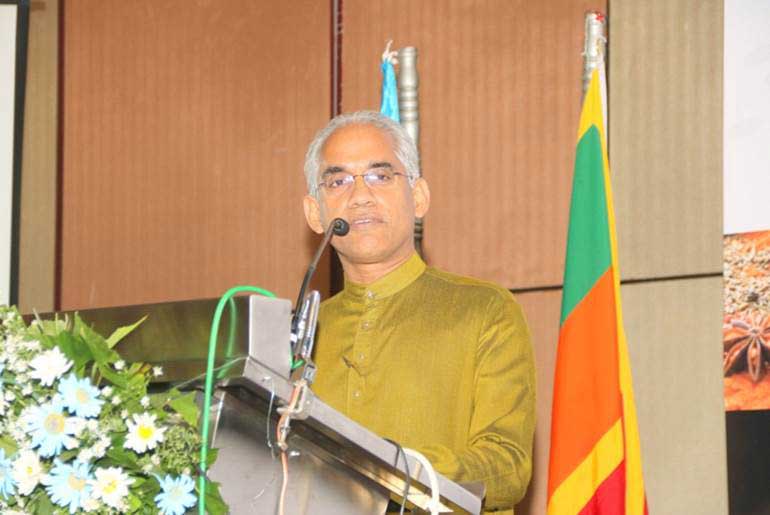
Address by Chief Guest Deputy Minister of State Enterprise Development Eran Wickramaratne
The Deputy Minister emphasised the fact that exports need to take centre stage. He added that the government will however not rush into creating new institutions such as the establishment of an Export-Import Bank as envisaged in the budget proposals for 2016, but will explore other ways and means to support exporters, focusing on interim measures to provide export finance using windows and mechanisms like the Sri Lanka Export Credit Insurance Corporation, and even State Banks, to encourage exports. He added that while the idea to set-up an EXIM Bank was a good one it needed to be capitalised properly since Banks do not come cheap, needing large amounts of capital.
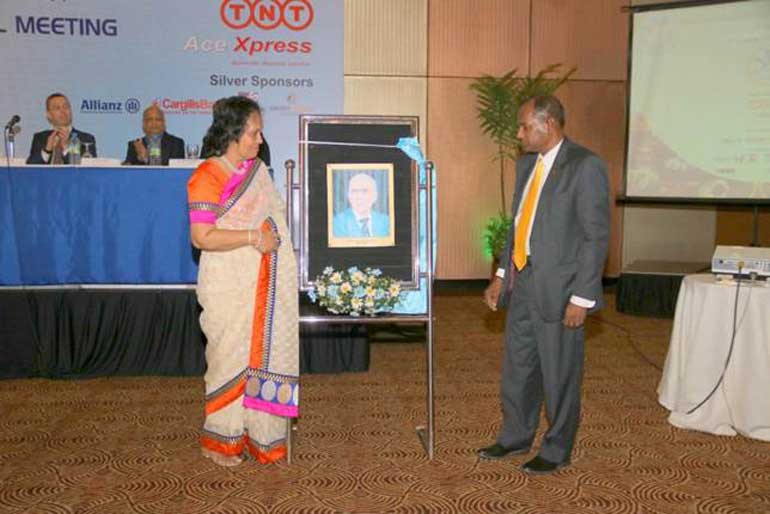
Unveiling of a portrait of NCE Founder President Deshabandu Patrick Amerasinghe
Deshabandu Patrick Amerasinghe Founder President of the National Chamber of Exporters of Sri Lanka (NCE) passed away 8 October 2015, after leading an active life. Hailing from Tangalle he had his early education at Ananda College, qualified thereafter as an Accountant and joined the Associated Newspapers of Ceylon Ltd. Following his hobbies of woodwork and carpentry, he subsequently became an entrepreneur to manufacture wooden educational toys, and furniture, for export and the local market, using local raw materials, particularly rubber wood.
From his early years as an entrepreneur he was known as a ‘Crusader’ of Exporters, and felt very strongly that exporters should be given due recognition and treated as a ‘national treasure’, since exporters earned valuable foreign exchange for the country, generated employment opportunities particularly to the unemployed youth, and also helped attract foreign investments.
He was known as the pioneer of the Chamber movement in Sri Lanka. He also spearheaded the ‘Young Entrepreneurs of Sri Lanka (YESL) to promote the culture of entrepreneurship among school children, to make them independent and productive citizens.
He pioneered the ‘Annual Export Awards’ Ceremony of the Chamber in 1993 to recognise and reward the achievements of exporters in the International Market Place.
Deshabandu Amerasinghe was a strong lobbyist of exporter issues with the political Leadership and relevant state authorities particularly during his years as the President of the Chamber.
Three staff members honoured for their services at NCE for 10 and 20 years
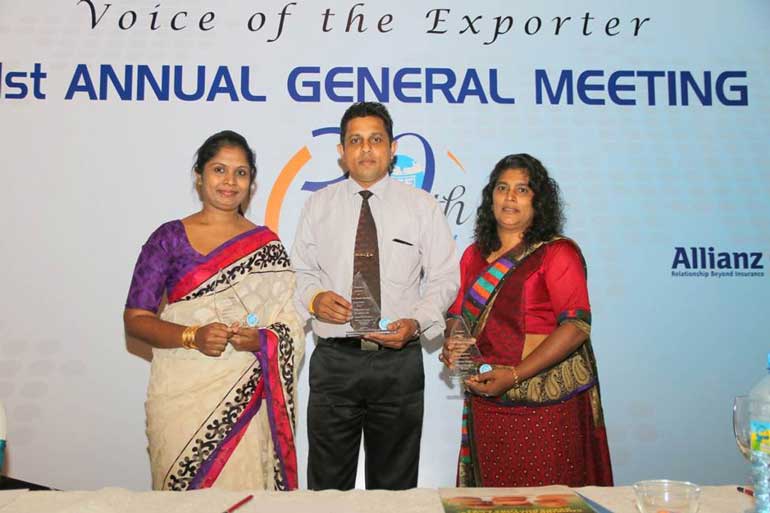
From left: Senior Manager Finance Tiromi Senadeera, Executive Officer Susantha Rupatunga and Senior Manager Operations Suneetha Ramanayake.
Vote of Thanks by Secretary General and CEO of the Chamber Shiham Marikar
Shiham Marikar thanked the distinguished invitees for gracing the occasion. He made particular mention of the keynote address delivered by Hilmy Cader which provided insights to the strategies that Sri Lanka could possibly adopt to accelerate exports by facing the challenges in the international market place. He thanked Ambassador Tim Huggins for his pointers to develop two way trade between Sri Lanka and Australia. He also thanked the President, Members of the Council, and Members of the Management Committee for the support and guidance extended to implement the various programs of the Chamber successfully, and the secretariat staff for their support and assistance
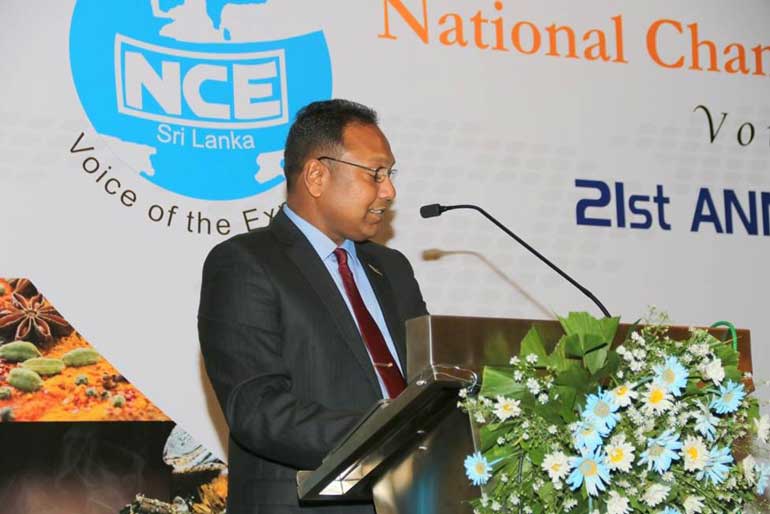 .
.
Secretary General and CEO of the Chamber Shiham Marikar